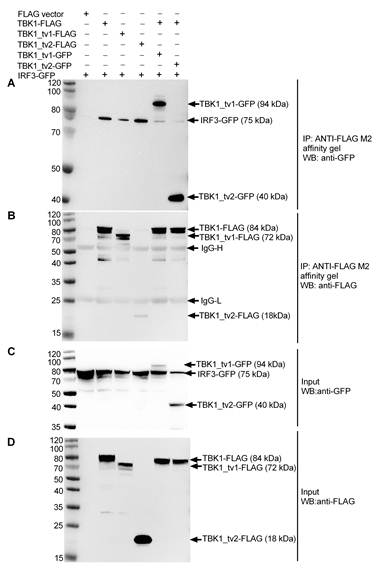
Newsroom
Researchers Identify TBK1 Isoforms as Negative Regulators in Teleost Innate Immunity
Alternative splicing plays an important role in regulating the function of immune system. TANK-binding kinase 1 (TBK1) is a pivotal serine/threonine protein kinase involved in antiviral signaling. However, alternative splicing patterns and the function of TBK1 isoform(s) remain unknown in teleost fish.
In the present study, the research group led by Prof. CHANG Mingxian from Institute of Hydrobiology (IHB) of Chinese Academy of Sciences reported that there were at least five splicing isoforms of TBK1 in zebrafish.
Overexpression of splicing isoforms TBK1_tv1 and TBK1_tv2 not only inhibited the activity of IFN promoter induced by spring viraemia of carp virus (SVCV) infection, but also inhibited RIG-I-, MAVS-, TBK1- and IRF3-mediated activation of IFN promoters.
Further analyses showed that TBK1_tv1 and TBK1_tv2 inhibited the phosphorylation and nuclear import of IRF3, and competitively associate with TBK1 and IRF3 to disrupt the formation of a functional TBK1-IRF3 complex.
Their research revealed that TBK1 splicing isoforms are dominant negative regulators in antiviral immune responses in teleost fish.
The findings are published online in Frontiers in Immunology entitled “TANK-Binding Kinase 1 (TBK1) isoforms negatively regulate Type I interferon induction by inhibiting TBK1-IRF3 interaction and IRF3 phosphorylation”.
This work is supported by National Natural Science Foundation of China Grants 31372531 and 31672687.

Figure: TBK1_tv1 and TBK1_tv2 associate with TBK1 and IRF3 to disrupt TBK1-IRF3 interaction (figure by IHB)